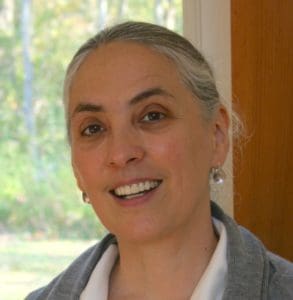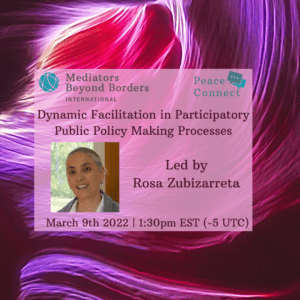Education, Translation, and Facilitation. Member Spotlight: Rosa Zubizarreta
Rosa Zubizarreta is Principal at Diapraxis, the consultancy she created where she facilitates creative collaboration across functional areas in organizations. She has also been an Associate at Dynamic Facilitation Associates, where she learned Dynamic Facilitation™ and the choice-creating process to foster breakthrough thinking. Rosa’s experience in working with conflict has been primarily within organizational spaces, though she notes that over the years, many mediators have attended her facilitation workshops and have found this approach to working with groups quite useful for multi-stakeholder mediations.
Though relatively new to MBBI, Rosa says she has already had inspirational experiences with other members. She first learned of the organization after meeting CEO Prabha Sankaranarayan through the National Coalition for Dialogue and Deliberation. Prabha spoke on the TRUST Network, a U.S.-based network designed to prevent violent conflict and build community cohesion, and this discussion led Rosa to join MBBI.
Career Journey
 Rosa was born in Peru, with a Peruvian father and a Cuban mother, and her family moved to the U.S. when she was a child. Her first career was in education; Rosa apprenticed with her mother, a professor in Multicultural Education, who also wrote and translated educational materials and children’s books. After working for a few years as a bilingual classroom teacher, Rosa earned a Master’s in Multicultural Education from University of San Francisco. She later worked at Developmental Studies Center, an education reform nonprofit where she wrote teachers’ guides for using children’s books for social and emotional learning.
Rosa was born in Peru, with a Peruvian father and a Cuban mother, and her family moved to the U.S. when she was a child. Her first career was in education; Rosa apprenticed with her mother, a professor in Multicultural Education, who also wrote and translated educational materials and children’s books. After working for a few years as a bilingual classroom teacher, Rosa earned a Master’s in Multicultural Education from University of San Francisco. She later worked at Developmental Studies Center, an education reform nonprofit where she wrote teachers’ guides for using children’s books for social and emotional learning.
In 2000, one of Rosa’s mentors invited her to a workshop where she found her life’s calling: a form of group facilitation that stimulates creativity and openness to diverse perspectives. “After attending this first workshop and being deeply moved, I realized it to was time to back to school. I wanted to do this creative facilitation work, but needed more background.” She completed a Master’s degree in Organizational Development at Sonoma State University in 2002, and her growing practice in Northern California included small businesses, community organizations, and diverse municipalities.
In 2005, Rosa moved across the country to rural Massachusetts for family reasons. There, she completed a Master’s in Social Work from Springfield College and worked a clinical therapist at a community mental health center, while continuing to practice facilitation and offering workshops from time to time. In 2011, she began travelling to Europe, where Dynamic Facilitation™ had started to spread, both to teach there as well as to meet fellow practitioners.
Her travels inspired her to return to school yet again; Rosa is currently completing a PhD in Human and Organizational Systems at Fielding Graduate University, where she is focusing on innovations in democracy.
Bürgerrate
Rosa’s dissertation is centered on the practice of Bürgerrate in Austria, a term which translates to “Citizen’s Councils” or “Civic Councils.” These Councils can be seen as part of a larger family of democratic innovations, often termed “deliberative democracy”, which include forms such as Citizens’ Assemblies, Citizen Juries, and Deliberative Polling. In Austria, Bürgerräte are designed to involve the public in generating policy for a variety of governance issues. Using a combination of random and stratified random sampling, the individuals selected to participate in these councils are reflective of the makeup of the larger community and can provide different perspectives on an issue. Though the Bürgerrate itself is a sequestered meeting, somewhat like a jury, they report their findings in an open public meeting run in World Café format. There, Council members share both their outcomes as well as their learning journey with the larger public, who thus also have the opportunity to reflect and respond.
In reading the literature on deliberative democracy, Rosa noticed a general consensus that facilitation has been understudied in this field, even while it is key to most of its practices. In her dissertation, she aims to learn from facilitators’ perspectives on their lived experiences facilitating these councils, and build connections between these narratives and dialogue theory. This will add to her body of written work, that currently includes various articles, chapters, and books on Dynamic Facilitation. “People were coming to the facilitation workshops and having powerful transformational experiences, but when we go back into mainstream culture, the experience tends to get “bubbled off” as a lovely memory. In the whole process of teaching Dynamic Facilitation, I love creating a participatory learning environment and helping people learn in different ways.” Staying true to her roots, Rosa has prioritized increasing access to knowledge and education; the Dynamic Facilitation manual she first started writing in 2002, and eventually published in 2014, is currently available in English, Spanish, and German.
 Rosa is hosting a MBBI webinar entitled Dynamic Facilitation in Participatory Public Policy Making Processes. This facilitation methodology can also be used for multi-stakeholder work. This 90-minute conversation event will be on March 9th, 2022, at 1:30 pm EST (UTC -5). Please use the Time Zone Converter to determine when this engaging conversation will be in your time zone. Register for it here.
Rosa is hosting a MBBI webinar entitled Dynamic Facilitation in Participatory Public Policy Making Processes. This facilitation methodology can also be used for multi-stakeholder work. This 90-minute conversation event will be on March 9th, 2022, at 1:30 pm EST (UTC -5). Please use the Time Zone Converter to determine when this engaging conversation will be in your time zone. Register for it here.
Article by Chloe Pan, MBBI Writer
